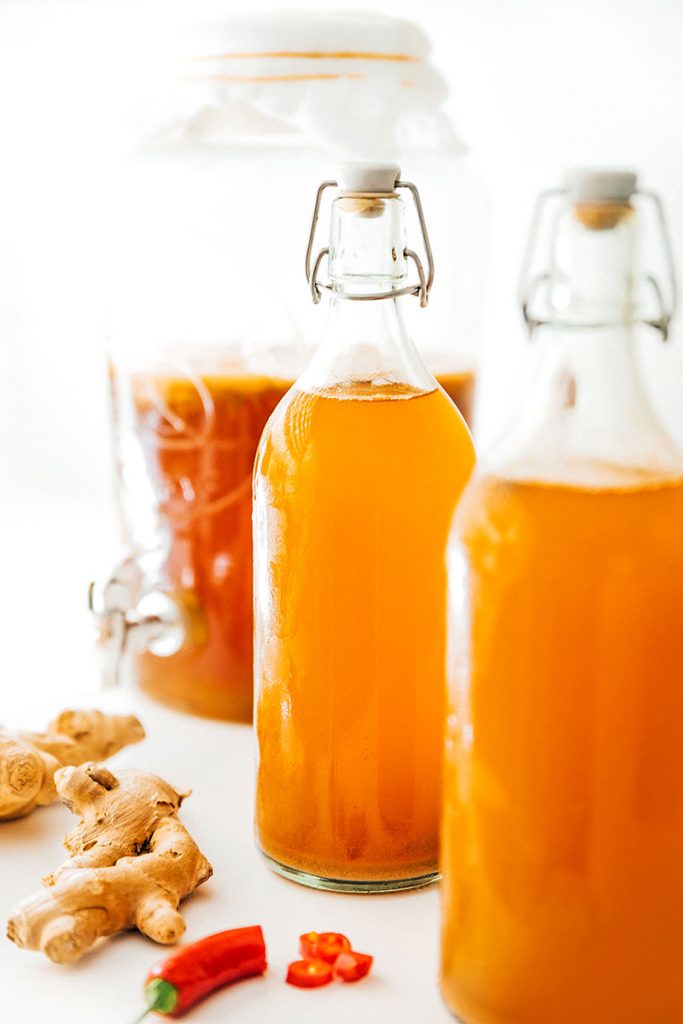Temperature plays an important role in brewing kombucha. Here’s what you need to know in order to ensure your homemade kombucha is brewing at its peak temperature!

If you read our guide to homemade kombucha, or if you’ve tried brewing before, you probably know that temperature plays a role in the fermentation of kombucha.
But what exactly is the ideal temperature for brewing kombucha? And how can you keep the temperature stable (even in those colder winter months)?

How temperature affects kombucha
Kombucha is fermented thanks to the microscopic power of bacteria and yeast! The yeast eat sugars in your sweet teas, transforming them into carbon dioxide (carbonation) and ethanol. The bacteria feed on this ethanol, turning it into acidity and giving kombucha its distinctively sour taste.
But in addition to needing enough “food” to feed on, these bacteria and yeast also have a temperature they like to live at.
When the temperature is too low, they tend to slow down, performing the fermentation at a slower rate (while also increasing the likelihood of mold). Kombucha brewed at cooler temperatures will be weaker and more sweet.
When the temperature is too high, these microorganisms begin to die or become weaker. Kombucha brewed at warmer temperatures will have a very strong vinegar and yeast flavor.
The ideal temperature for brewing kombucha
Kombucha can be brewed in a temperature range between 60-85°F (16-29°C), though for the most delicious kombucha, aim for a temperature range between 75-80°F (24-26°C).
How to maintain an ideal temperature
When preparing your kombucha for fermentation, it’s important to consider where it will be hanging out as it undergoes it’s magically delicious transformation.
If your house is warm (such as in the summer), place the kombucha somewhere cool, like a dark cupboard or the basement. You should also taste your kombucha more regularly in warmer climates, as it will ferment much more quickly.
If your house is cool (such as in the winter), find a warm spot in your house, like the laundry room, above a fridge, or near a radiator/heater. If you have a difficult time keeping your kombucha in a safe temperature zone, consider purchasing an affordable heat mat, an energy-efficient wrap that goes around your jar to keep your kombucha at a stable temperature.

Hi,
Apologies if this is obvious! Are we talking air temperature or the liquid temperature here? I’ve been wondering if mine is too warm (in a dark cupboard next to the boiler) and when I put the temp probe into the kombucha it show 65 degrees. In the whole, my brew is too sharp and I’m trying to soften it a bit. I’ve been brewing for a year so I’m not quite a newbie!!
Thanks
I go by air temp!
Hi I am going away for seven weeks and my scooby will be in 5 litres
of fresh brewed tea I will start the fresh fermentation 1 week before I go then I will turn off the heat mat, it will be kept in a dark cupboard
but with no heat mat for 7 weeks will it be ok, I don’t want to put it in the fridge just slow down the fermentation time which nominally takes 4/5 weeks
Your plan sounds good! Should be okay for that long, I regularly store mine for that long while taking breaks and haven’t had issues 🙂
Hi I am new to this, but I tasted the store bought one and loved it.so I got a starter kit..the original Scooby was a re brew, first batch came out great, the second grew mold, the Scooby still looked healthy but I read that you have to throw it in the compost. The other Scooby (baby) had just a small area not even a dime size of mold starting. I didn’t want to throw it out as well. I’m trying it again.I have made my tea the sun tea way.could that affect it.. Lost
It’s best to use boiled tea, which kills bacteria in the water and vessel. Then add your starter once it has cooled down. Next time try adding double the amount of starter!
Hello,
I received a SCOBY and starter tea from a friend a few days ago. On my way home I stopped and went inside somewhere and left the tea in the car–it was in two plastic grocery bags for about 25 minutes. I don’t know if the sun beat down on them or not but it was close to 100 degrees outside.
Now, several days later I haven’t started my tea yet (but am ready to) but now I’m paranoid of botulism or some other scary thing from leaving it in the car. The jar was not hot to the touch or anything, but do you think it’s safe to use?
Thank you!
I think it is probably safe to use! 😀
Hi Sarah,
I will be travelling over the next few months. I am thinking of taking a bottle of Kombucha in my check in luggage. Any problems for Kombuchas to take flights? Will the Probiotics bacteria die due to the temperature and pressure changes while on flights? Thanks
I don’t think the probiotics will die, but just be sure to wrap them well to prevent explosions!
Help…..I just started up a new batch of kombucha in my 2.5 gallon continuous brewer the first day my temp was 70% F in order to raise the temp I added a string of Christmas lights got up this morning to check it & it was up to 110% F should I throw it all out or can I somehow save it ??? I have more scobys in my hotel
That’s indeed very hot, but it may be okay! I would add a bottle of unflavored kombucha from a different batch to make sure there are enough surviving bacteria and yeast to ferment the brew!
I started a new batch of kombucha and used a heat mat and my brew got to 104F on the fist day of brewing (24hrs). I unplugged the heat mat as soon as I discovered the high temp. Do you think my SCOBY and batch will be ok?
They could be! Just keep an eye out for mold, which would indicate that the healthy bacteria and yeast might have been killed in that high heat. But if no mold develops and the taste and smell is right, it could pull through!
Hi, I am new to brewing kombucha and I have two questions.
I started brewing it in a cool dark spot but got mold. A pale, grey matt of fuzz on the surface of the scobie. The mold doesn’t seem to be an issue, my first brew was not as sour as I would have like but tasted delicious. The mold smells remarkably good reminding me of the flor on aging sherry.
In the winter my house fluctuates between 16-20C, except the kitchen which goes higher due to heat from the stove and, being south-facing with lots of windows, it gets warm on sunny days. What effect does temperature fluctuation have?
Thanks for your time and thanks for all the great information.
Andrew
Hi Andrew! I actually haven’t done much research into temperature fluctuations on brew, but it’s a great question! This thread may be helpful.
I have a hard layer in my brew after 7 days of brewing. IT is rather cold in my house. IT gets down to 55 at night. I tasted the brew and it is still sweet. Can it still be saved?
As long as there is no sign of mold, it should be fine! Just try to move it to the warmest area possible!
Thanks Sarah. Appreciate the comforting words as I am concerned that my Kombucha will fail.
Hi HI,
I am new to brewing Kombucha. My room temperature is 29 Degrees C. Is it too high. I have tried to put it in different locations in the coolest spot at home, but I can only get 29 Degrees C sometimes it goes up to 30 degrees C. Is there any danger that my kombucha cannot work? I use a temperature sensing device next to my jar and I check regularly without moving my jar
Just get it the coolest you can – if that’s 29C then that’s just how it will be! There is less risk when it’s too warm, which usually just makes it ferment faster (vs. too cold, which can lead to mold). You should be fine!